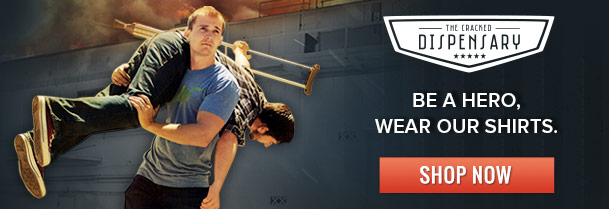The 6 Worst Attempts to Get Superheroes to Work on TV

ABC's new, mostly superheroless Law & Order-meets-The X-Files hybrid, Agents of S.H.I.E.L.D., debuted last week to huge ratings. Warner Bros. took notice and immediately greenlit Gotham for the Fox network -- a show that takes place in the Batman universe but will focus on a young Commissioner Gordon instead. (Every episode ends with Jim Gordon gazing wistfully at the sky and musing, "What this corrupt town needs is a brave MAN who dresses as a BAT. Or a SEAL. Whatever, I don't give a fuck.")

Gotham's savior reveals himself during sweeps week.
They further upped the ante by announcing a series based on Constantine (the famed paranormal detective invented by Alan Moore and Keanu Reeves) and adding the Flash to the second season of Arrow, a show that had previously attempted to avoid featuring any characters with superhuman powers but boldly decided "Fuck it" in the wake of the billions of dollars superhero movies have made in the past year. Yes, it seems the timing has never been better for networks to unleash superhero television on us.

Except that, historically, live-action superhero shows have never, ever worked. Sure, the public eventually came around to the idea of superhero movies once the technology had progressed enough to make onscreen displays of superhuman abilities look like anything more than the most absurd bullshit ever captured on film. But comic book metahumans have never been a sustainable premise for prime time television, because we as an audience inevitably reject it. Here are six of the worst examples.
Birds of Prey (2002)

In the early 2000s, the WB decided that America needed a show about Batman's illegitimate daughter doing back flips to a nu-metal soundtrack. Batman, Catwoman, and the Joker appear in hazy flashbacks, but it wasn't enough to make people give a shit, and the show got cancelled after four months.

Not even casting Ferris Bueller's girlfriend as Harley Quinn could make us care.

The creators of Smallville (a superhero show that managed to cling to life for 10 seasons despite atrocious ratings in its later years) decided to try their angsty teen magic on Aquaman, but everyone quickly realized that you can't make a show about a guy who swims really fast because it looks incredibly stupid:

You managed to make Entourage look less stupid. Congrats.

Power Pack was a Marvel Comics series about a group of preteen siblings with superpowers bestowed on them by an alien Jesus to defend the Earth from destruction. It was made into a television pilot in the early '90s, featuring such breathtaking displays of might as a girl cleaning her room at the speed of rainbows:

"Well, there goes half our budget; now what?"

Generation X was Marvel Comics' attempt to make an X-Men TV show, but for some reason they substituted Wolverine, Cyclops, and Professor X for such headliners as Mondo, Banshee, and Jubilee and had them fight a mad scientist. Instead of, you know, Magneto:

Unsurprisingly, it was not picked up as a series.
No Ordinary Family (2010)

No Ordinary Family was ABC's attempt to make The Incredibles into a live-action show without calling it "The Incredibles" or featuring any characters that anybody cared about.

Except Michael Chiklis. Everyone likes Michael Chiklis.
It ran for a season and then went the way of Heroes, which as you may remember was another hip, modern show about superheroes that people quickly stopped watching.
Nick Fury: Agent of S.H.I.E.L.D. (1998)

Marvel already tried to bring the exploits of S.H.I.E.L.D. to the small screen back in 1998 with an extended pilot starring David Hasselhoff as Nick Fury, back before people dumped large sums of money into projects that were deliberately ironic:

Just look at that dazzling helicarrier.
Hasselhoff is upset that he wasn't asked to reprise the role for The Avengers, because apparently his superpower is being completely immune to self-awareness.
There are dozens more examples throughout the decades, including Shazam, The Tick, The Justice League, and Dr. Strange, that prove that comic books just don't translate well into television shows. The most successful examples were either deliberately campy (Adam West's Batman, wherein Batman's costume has eyebrows on it and you can see Cesar Romero's mustache underneath his Joker makeup because they were trying to make the stupidest fucking show anyone had ever seen) or produced entirely in-house by a studio who didn't need them to succeed (see: 10 seasons' worth of Smallville).
It may be because we are so used to big-budget superhero movies that we are unable to scale back our expectations for TV. There is a razor-thin line between "badass" and "utterly ridiculous," and superheroes toe that line every time they ask us not to laugh our asses off at someone in a bat costume. Conversely, there's only so many times a TV show can introduce a character in jeans and a jacket and tell us he's a superhero before we change the channel.

Pictured: Some asshole in a Superman jacket.
Whatever the reason, people just don't stay fans of superhero television for very long. Superheroes seem best reserved for two-hour doses every two to four years, with a mandatory cleansing reboot every third cycle.
Tom is an editor and columnist right here at Cracked.
